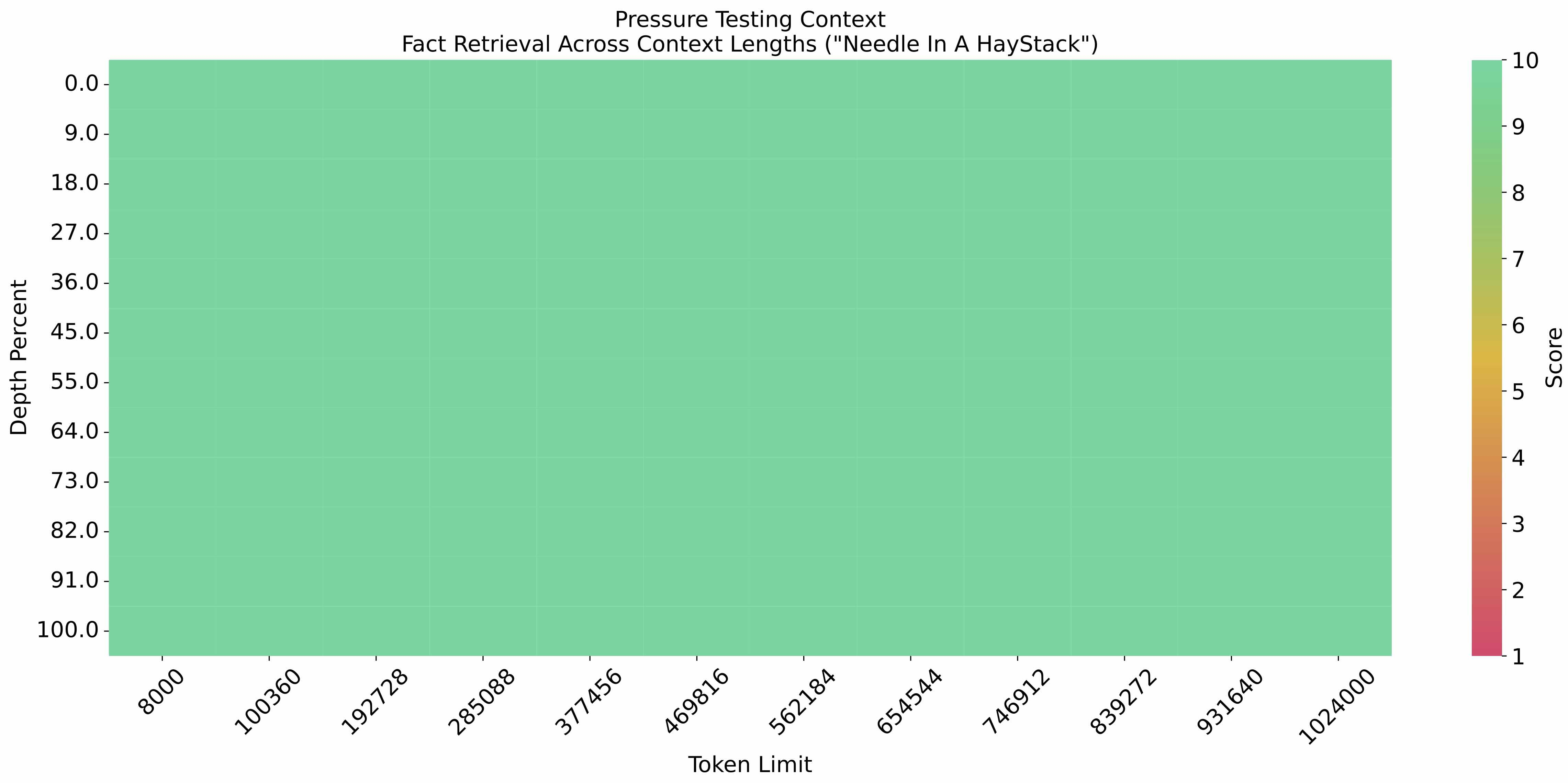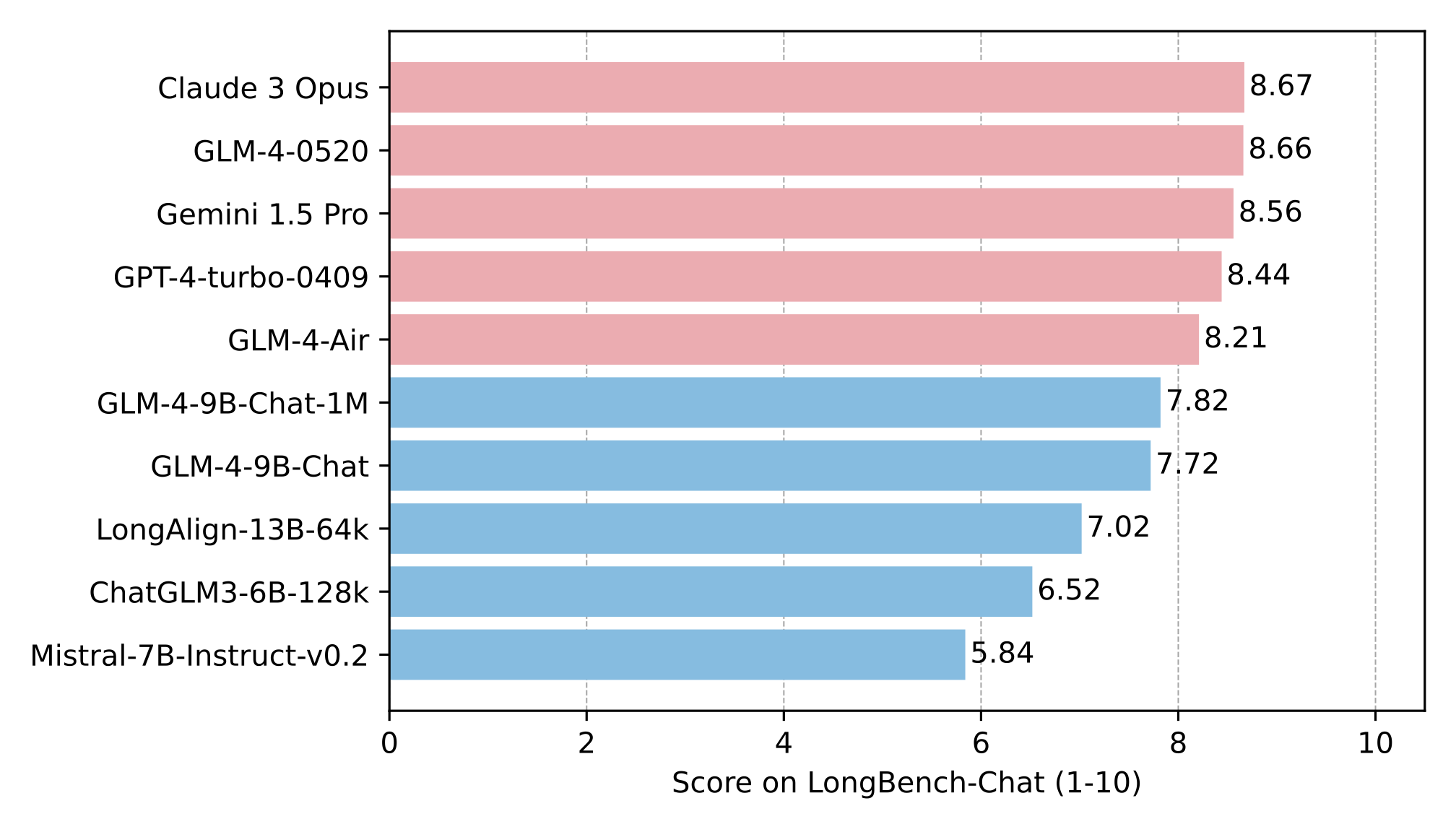Spaces:
Runtime error
Runtime error
| # GLM-4-9B-Chat | |
| ## Model Introduction | |
| GLM-4-9B is the open-source version of the latest generation of pre-trained models in the GLM-4 series launched by Zhipu | |
| AI. In the evaluation of data sets in semantics, mathematics, reasoning, code, and knowledge, **GLM-4-9B** | |
| and its human preference-aligned version **GLM-4-9B-Chat** have shown superior performance beyond Llama-3-8B. In | |
| addition to multi-round conversations, GLM-4-9B-Chat also has advanced features such as web browsing, code execution, | |
| custom tool calls (Function Call), and long text | |
| reasoning (supporting up to 128K context). This generation of models has added multi-language support, supporting 26 | |
| languages including Japanese, Korean, and German. We have also launched the **GLM-4-9B-Chat-1M** model that supports 1M | |
| context length (about 2 million Chinese characters) and the multimodal model GLM-4V-9B based on GLM-4-9B. | |
| **GLM-4V-9B** possesses dialogue capabilities in both Chinese and English at a high resolution of 1120*1120. | |
| In various multimodal evaluations, including comprehensive abilities in Chinese and English, perception & reasoning, | |
| text recognition, and chart understanding, GLM-4V-9B demonstrates superior performance compared to | |
| GPT-4-turbo-2024-04-09, Gemini 1.0 Pro, Qwen-VL-Max, and Claude 3 Opus. | |
| ## Benchmark | |
| We evaluated the GLM-4-9B-Chat model on some classic tasks and obtained the following results: | |
| | Model | AlignBench-v2 | MT-Bench | IFEval | MMLU | C-Eval | GSM8K | MATH | HumanEval | NCB | | |
| |:--------------------|:-------------:|:--------:|:------:|:----:|:------:|:-----:|:----:|:---------:|:----:| | |
| | Llama-3-8B-Instruct | 5.12 | 8.00 | 68.58 | 68.4 | 51.3 | 79.6 | 30.0 | 62.2 | 24.7 | | |
| | ChatGLM3-6B | 3.97 | 5.50 | 28.1 | 66.4 | 69.0 | 72.3 | 25.7 | 58.5 | 11.3 | | |
| | GLM-4-9B-Chat | 6.61 | 8.35 | 69.0 | 72.4 | 75.6 | 79.6 | 50.6 | 71.8 | 32.2 | | |
| ### Long Context | |
| The [eval_needle experiment](https://github.com/LargeWorldModel/LWM/blob/main/scripts/eval_needle.py) was conducted with | |
| a context length of 1M, and the results are as follows: | |
|  | |
| The long text capability was further evaluated on LongBench, and the results are as follows: | |
|  | |
| ### Multi Language | |
| The tests for GLM-4-9B-Chat and Llama-3-8B-Instruct are conducted on six multilingual datasets. The test results and the | |
| corresponding languages selected for each dataset are shown in the table below: | |
| | Dataset | Llama-3-8B-Instruct | GLM-4-9B-Chat | Languages | | |
| |:------------|:-------------------:|:-------------:|:----------------------------------------------------------------------------------------------:| | |
| | M-MMLU | 49.6 | 56.6 | all | | |
| | FLORES | 25.0 | 28.8 | ru, es, de, fr, it, pt, pl, ja, nl, ar, tr, cs, vi, fa, hu, el, ro, sv, uk, fi, ko, da, bg, no | | |
| | MGSM | 54.0 | 65.3 | zh, en, bn, de, es, fr, ja, ru, sw, te, th | | |
| | XWinograd | 61.7 | 73.1 | zh, en, fr, jp, ru, pt | | |
| | XStoryCloze | 84.7 | 90.7 | zh, en, ar, es, eu, hi, id, my, ru, sw, te | | |
| | XCOPA | 73.3 | 80.1 | zh, et, ht, id, it, qu, sw, ta, th, tr, vi | | |
| ### Function Call | |
| Tested | |
| on [Berkeley Function Calling Leaderboard](https://github.com/ShishirPatil/gorilla/tree/main/berkeley-function-call-leaderboard). | |
| | Model | Overall Acc. | AST Summary | Exec Summary | Relevance | | |
| |:-----------------------|:------------:|:-----------:|:------------:|:---------:| | |
| | Llama-3-8B-Instruct | 58.88 | 59.25 | 70.01 | 45.83 | | |
| | gpt-4-turbo-2024-04-09 | 81.24 | 82.14 | 78.61 | 88.75 | | |
| | ChatGLM3-6B | 57.88 | 62.18 | 69.78 | 5.42 | | |
| | GLM-4-9B-Chat | 81.00 | 80.26 | 84.40 | 87.92 | | |
| **This repository is the model repository of GLM-4-9B-Chat, supporting `128K` context length.** | |
| ## Quick call | |
| **For hardware configuration and system requirements, please check [here](basic_demo/README_en.md).** | |
| ### Use the following method to quickly call the GLM-4-9B-Chat language model | |
| Use the transformers backend for inference: | |
| ```python | |
| import torch | |
| from transformers import AutoModelForCausalLM, AutoTokenizer | |
| device = "cuda" | |
| tokenizer = AutoTokenizer.from_pretrained("THUDM/glm-4-9b-chat", trust_remote_code=True) | |
| query = "Hello" | |
| inputs = tokenizer.apply_chat_template([{"role": "user", "content": query}], | |
| add_generation_prompt=True, | |
| tokenize=True, | |
| return_tensors="pt", | |
| return_dict=True | |
| ) | |
| inputs = inputs.to(device) | |
| model = AutoModelForCausalLM.from_pretrained( | |
| "THUDM/glm-4-9b-chat", | |
| torch_dtype=torch.bfloat16, | |
| low_cpu_mem_usage=True, | |
| trust_remote_code=True | |
| ).to(device).eval() | |
| gen_kwargs = {"max_length": 2500, "do_sample": True, "top_k": 1} | |
| with torch.no_grad(): | |
| outputs = model.generate(**inputs, **gen_kwargs) | |
| outputs = outputs[:, inputs['input_ids'].shape[1]:] | |
| print(tokenizer.decode(outputs[0], skip_special_tokens=True)) | |
| ``` | |
| Use the vLLM backend for inference: | |
| ```python | |
| from transformers import AutoTokenizer | |
| from vllm import LLM, SamplingParams | |
| # GLM-4-9B-Chat-1M | |
| # max_model_len, tp_size = 1048576, 4 | |
| # GLM-4-9B-Chat | |
| # If you encounter OOM, it is recommended to reduce max_model_len or increase tp_size | |
| max_model_len, tp_size = 131072, 1 | |
| model_name = "THUDM/glm-4-9b-chat" | |
| prompt = [{"role": "user", "content": "hello"}] | |
| tokenizer = AutoTokenizer.from_pretrained(model_name, trust_remote_code=True) | |
| llm = LLM( | |
| model=model_name, | |
| tensor_parallel_size=tp_size, | |
| max_model_len=max_model_len, | |
| trust_remote_code=True, | |
| enforce_eager=True, | |
| # GLM-4-9B-Chat-1M If you encounter OOM phenomenon, it is recommended to enable the following parameters | |
| # enable_chunked_prefill=True, | |
| # max_num_batched_tokens=8192 | |
| ) | |
| stop_token_ids = [151329, 151336, 151338] | |
| sampling_params = SamplingParams(temperature=0.95, max_tokens=1024, stop_token_ids=stop_token_ids) | |
| inputs = tokenizer.apply_chat_template(prompt, tokenize=False, add_generation_prompt=True) | |
| outputs = llm.generate(prompts=inputs, sampling_params=sampling_params) | |
| print(outputs[0].outputs[0].text) | |
| ``` | |
| ## LICENSE | |
| The weights of the GLM-4 model are available under the terms of [LICENSE](LICENSE). | |
| ## Citations | |
| If you find our work useful, please consider citing the following paper. | |
| ``` | |
| @article{zeng2022glm, | |
| title={Glm-130b: An open bilingual pre-trained model}, | |
| author={Zeng, Aohan and Liu, Xiao and Du, Zhengxiao and Wang, Zihan and Lai, Hanyu and Ding, Ming and Yang, Zhuoyi and Xu, Yifan and Zheng, Wendi and Xia, Xiao and others}, | |
| journal={arXiv preprint arXiv:2210.02414}, | |
| year={2022} | |
| } | |
| ``` | |
| ``` | |
| @inproceedings{du2022glm, | |
| title={GLM: General Language Model Pretraining with Autoregressive Blank Infilling}, | |
| author={Du, Zhengxiao and Qian, Yujie and Liu, Xiao and Ding, Ming and Qiu, Jiezhong and Yang, Zhilin and Tang, Jie}, | |
| booktitle={Proceedings of the 60th Annual Meeting of the Association for Computational Linguistics (Volume 1: Long Papers)}, | |
| pages={320--335}, | |
| year={2022} | |
| } | |
| ``` | |